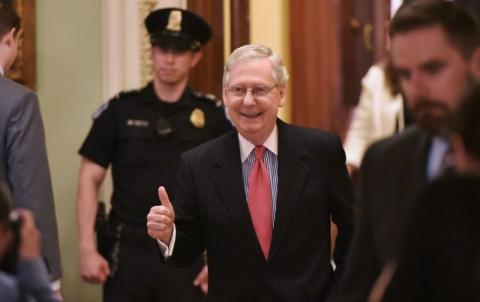Share
Senate Changes Rules For SCOTUS Confirmation - What Does it Mean?

What happened?
By a simple majority vote, Majority Leader Mitch McConnell, R-Ky., set a new precedent in the Senate that will ease the confirmation for President Trump's Supreme Court nominee Neil Gorsuch on Friday, after 30 more hours of debate on the floor. "This will be the first, and last, partisan filibuster of a Supreme Court justice," said McConnell in a closing floor speech.
Why?
Democrats opposed Gorsuch for a variety of reasons, including his conservative judicial philosophy, dissatisfaction with his answers during his confirmation hearings and a simmering resentment towards McConnell's decision to block any consideration of President Obama's nominee Merrick Garland last year. "We believe that what Republicans did to Merrick Garland was worse than a filibuster," said Senate Minority Leader Charles Schumer, D-N.Y.
What does it mean?
By essentially eliminating the filibuster for Supreme Court nominees — an extension of the 2013 nuclear option triggered by then-Senate Majority Leader Harry Reid, D-Nev., for all lower court and executive branch nominees — all presidential nominees will now face a far easier path navigating through the Senate confirmation process. It also could make it easier for presidents to appoint more overtly partisan justices to the Supreme Court.
So the future of our nation's politics got even worse? Wow.
The filibuster and the rights it gives to individual senators and the minority party are reasons why the Senate has long considered itself "the greatest deliberative body in the world." But the use of filibusters and the polarization between the two parties have dramatically increased in the past two decades, making it harder and harder for the Senate to reach bipartisan consensus even on matters like the annual 12 spending bills.
Source: http://www.npr.org/2017/04/06/522847700/senate-pulls-nuclear-trigger-to-ease-gorsuch-confirmation
Image Credit: Mandel Ngan/AFP/Getty Images
